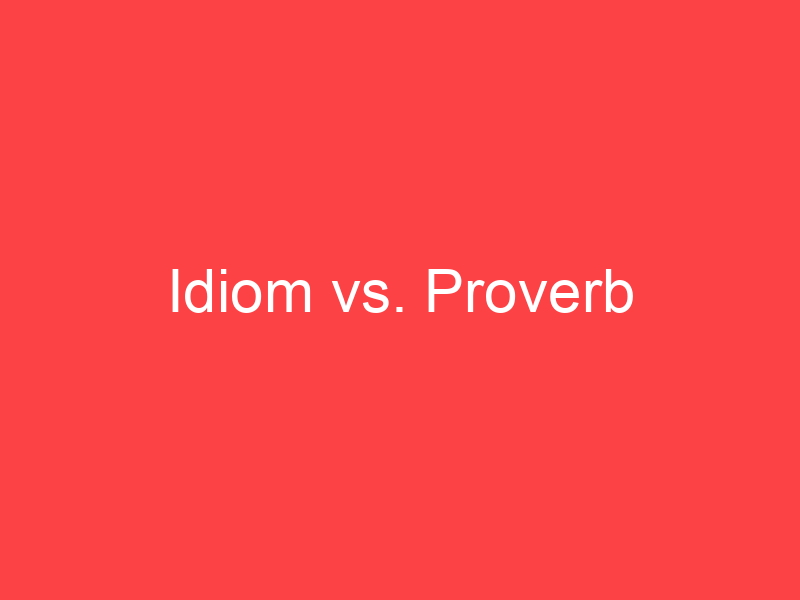Main Difference
The main difference between Idiom and Proverb is that the Idiom is a combination of words that has a figurative meaning and Proverb is a saying that gives advice, usually as a metaphor.
-
Idiom
An idiom (Latin: idiomī, “special property”, from Ancient Greek: ἰδίωμα, translit. idíōma, “special feature, special phrasing, a peculiarity”, f. Ancient Greek: ἴδιος, translit. ídios, “one’s own”) is a phrase or an expression that has a figurative, or sometimes literal, meaning. Categorized as formulaic language, an idiom’s figurative meaning is different from the literal meaning. There are thousands of idioms, occurring frequently in all languages. It is estimated that there are at least twenty-five thousand idiomatic expressions in the English language.
-
Proverb
A proverb (from Latin: proverbium) is a simple, concrete, traditional saying that expresses a perceived truth based on common sense or experience. Proverbs are often metaphorical and use formulaic language. Collectively, they form a genre of folklore.
Some proverbs exist in more than one language because people borrow them from languages and cultures similar to theirs. In the West, the Bible (including, but not limited to the Book of Proverbs) and medieval Latin (aided by the work of Erasmus) have played a considerable role in distributing proverbs. Not all Biblical proverbs, however, were distributed to the same extent: one scholar has gathered evidence to show that cultures in which the Bible is the “major spiritual book contain between three hundred and five hundred proverbs that stem from the Bible,” whereas another shows that, of the 106 most common and widespread proverbs across Europe, eleven are from the Bible. However, almost every culture has its own unique proverbs.
-
Idiom (noun)
A manner of speaking, a mode of expression peculiar to a language, person, or group of people.
-
Idiom (noun)
A language or language variety; specifically, a restricted dialect used in a given historical period, context etc.
-
Idiom (noun)
An established expression whose meaning is not deducible from the literal meanings of its component words, often peculiar to a given language.
-
Idiom (noun)
An artistic style (for example, in art, architecture, or music); an instance of such a style.
-
Idiom (noun)
A programming construct or phraseology that is characteristic of the language.
-
Proverb (noun)
A applied to common situations.
-
Proverb (noun)
A striking or paradoxical assertion; an obscure saying; an enigma; a parable.
-
Proverb (noun)
A familiar illustration; a subject of contemptuous reference.
-
Proverb (noun)
A drama exemplifying a proverb.
-
Proverb (verb)
To write or utter proverbs.
-
Proverb (verb)
To name in, or as, a proverb.
-
Proverb (verb)
To provide with a proverb.
-
Idiom (noun)
a group of words established by usage as having a meaning not deducible from those of the individual words (e.g. over the moon, see the light).
-
Idiom (noun)
a form of expression natural to a language, person, or group of people
“he had a feeling for phrase and idiom”
-
Idiom (noun)
the dialect of a people or part of a country.
-
Idiom (noun)
a characteristic mode of expression in music or art
“they were both working in a neo-impressionist idiom”

